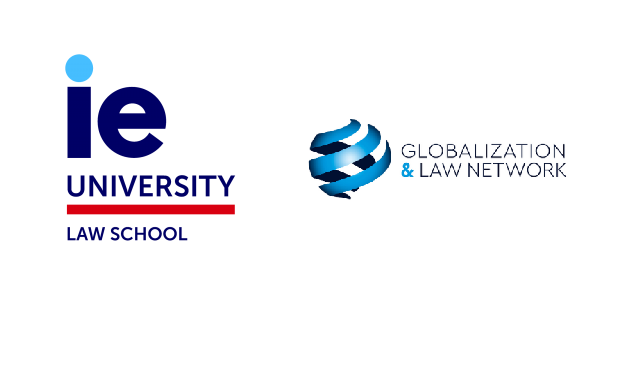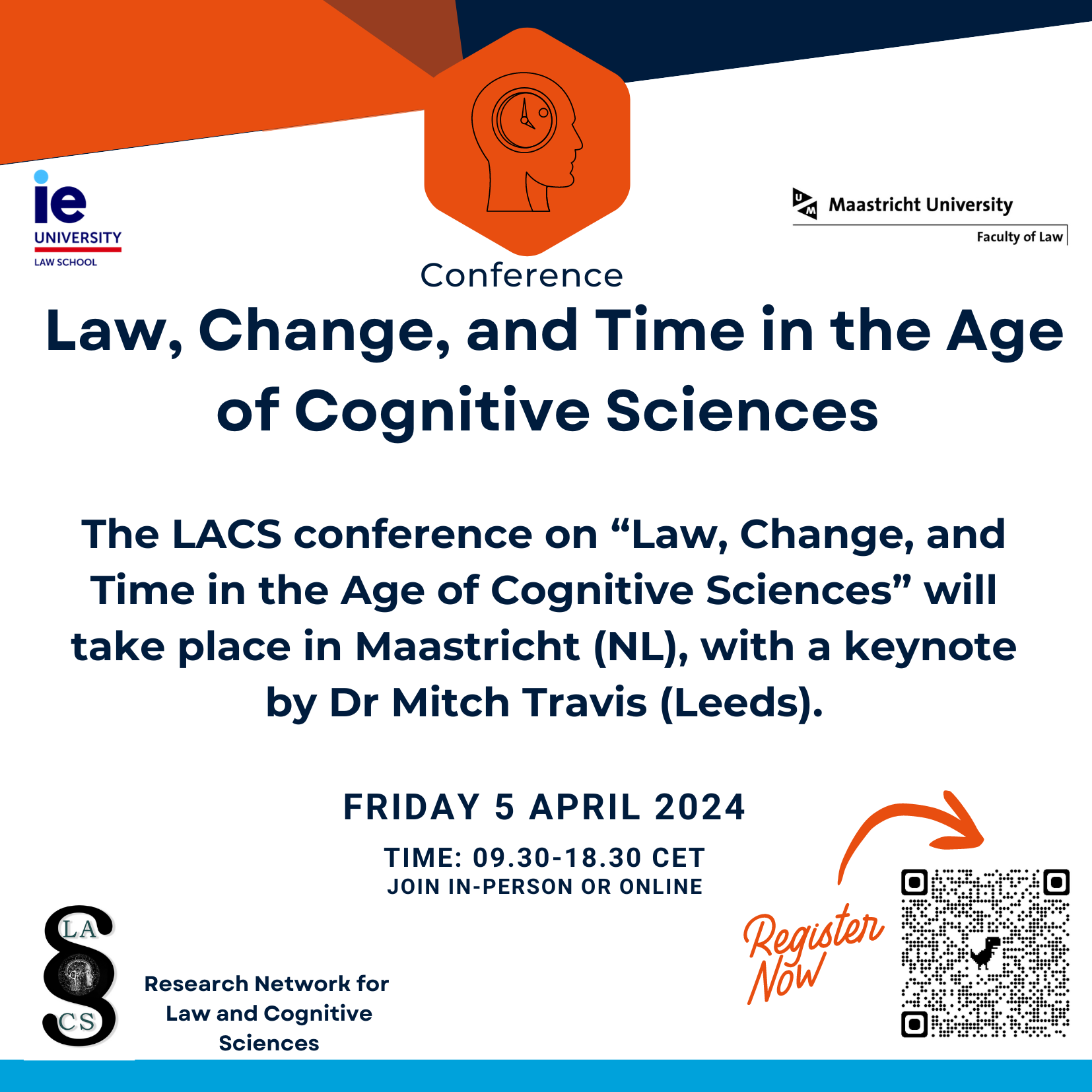Conference “Law, Change, and Time in the Age of Cognitive Sciences”
Research Network for Law and Cognitive Sciences
***** THIS CONFERENCE IS CANCELLED *****
The LACS conference on “Law, Change, and Time in the Age of Cognitive Sciences” will take place in Maastricht (NL), with a keynote by Dr Mitch Travis (Leeds).
This will be an hybrid event with an option to join online via Zoom.
Time pervades all dimensions of law. Time manifests as a function of the most conventional aspects of law, including law’s role in defining, regulating, and sanctioning human conduct as well as in governing and protecting societies. By the same token, law and legal processes do not exist outside of time. The relationship between law and time can be articulated through at least three broad dimensions (or legal temporalities), including:
1) Functional legal temporalities, i.e., the objectives the law seeks to achieve based on past events and/or future goals. Examples of such temporalities involve, for instance, the goals of punishment for the determination of sanctions, or the implementation of tools such as neuropsychological testing to assess past, present and future events.
2) Transformational legal temporalities, which reflect the development of law across changing political, moral, scientific, and societal landscapes. These temporalities comprise, for instance, institutional change; changes in legal foundations, concepts, rules and their underlying paradigms.
(3) Experiential legal temporalities, which pertains to the role of time in the law as concretely applied on and experienced by the individuals. This type of temporalities includes, for instance: the identification of the relevant “moment” of criminal responsibility for the purposes of adjudication; judicial decision-making.
Even though ‘legal time’ is inextricably marked by these temporalities, it may be said to be artificial as it does not necessarily correspond to the temporalities that the law is meant to impact. That is, there may be a mismatch between (on the one hand) the way in which time is reflected in the law (in each of its different dimensions) and the way in which the law depicts time, and (on the other hand) how such time is represented and experienced in non-legal dimensions. Accordingly, the time of law is often not respondent to the time of individuals and society, including their shifting moral paradigms, political ideas, evolving social standards, and renewed knowledge. For instance, with regard to transformational legal temporalities, an increasingly common claim is that the progress of law does not keep pace with advances of new sciences and technologies. Considering the law’s slow adaptation to (more fast-paced) scientific and technological change, a risk exists that the law fails to fulfill its proclaimed roles in a variety of contexts.
Against this backdrop, this LACS Conference intends to explore the specific contribution of modern cognitive sciences (including neuroscience, neurotechnology, philosophy of mind, psychology, artificial intelligence, robotics) in giving substance and (re)defining the complex and dynamic relationship between time, law, and change across the three temporalities sketched above. The core questions this conference seeks to tackle include: What role does time play in shaping the contribution of cognitive sciences to the law? Can cognitive sciences shift the relational dynamics between law and time? Can cognitive sciences promote change to law’s temporalities across different normative domains (e.g., adjudicative; institutional)? Can knowledge from cognitive science aid the law in keeping pace with more nuanced understandings of human conduct across different dimensions? Can cognitive sciences help the law more effectively regulate innovation?

Contact for registrations: Chantal Meertens, Law Events Office
Organisers: Dr. Antonia Waltermann, Prof. David Roef (Maastricht University) and Dr. Federica Coppola (IE University Law School (Spain)
This event is funded by the UM Law Faculty research fund WECIE and partly by IE University Law School (Spain).
Conference programme
09:30 – 10:00 Coffee and welcome
10:00 – 11:15 Keynote by Dr Mitch Travis
11:15 – 12:00 Dr Alessia Farano, Time and Legal Normativity
12:00 – 12:45 Erica Vaccaro & Guiseppe Corbelli, Automated and human decision-making
12:45 – 14:00 Lunch
14:00 – 14:45 Giovana Figueiredo Peluso Lopes, Judicial Bias and Institutional Debiasing Strategies
14:45 – 15:30 Alessandra Piconese, Digital Innovation in justice
15:30 – 16:15 Dr Miguel Julia-Pijoan, Predicting criminal behavior from neuroscience
16:15 – 16:30 Coffee
16:30 – 17:15 Dr Massimo Fichera, Lawscapes and chronoscapes
17:15 – 18:00 Plenary discussion followed by drinks
18:00 - 18:30 Drinks
Conference fee
Registration fee regular: € 25,00 (including coffee breaks and lunch)
Registration fee student: € 10,00 (including coffee breaks and lunch)
Registration fee regular online: € 10,00
Registration fee student online: € 10,00
Unfortunately we had to cancel this conference. Paid fees will be reimbursed. We apologise for the inconvenience this may cause.

Also read
-
29 May 31 May
Emerging Issues and Challenges in Privacy and Cybersecurity
This 2,5 days training programme is a building block of the full Diploma Track on Privacy Management.
-
05 Jun09:45 - 14:30
10th International IP Congress
Each year, speakers from Queen Mary University of London, Universidad Autónoma de Madrid and Maastricht University provide a compact and insightful update on the most recent legal developments in the main areas of intellectual property law in Europe. This year, the focus will be on on IP and...
-
12 Jun 13 Jun00:00
Recharacterising International Disputes: Exploring the Phenomenon of Multi-Fora Litigation
The global landscape has seen an uptick in the utilization of international and regional courts, with a broader set of norms and circumstances now subject to adjudication. This pattern raises questions about the reasons behind such recharacterization, the appropriate methods for judicial bodies to...